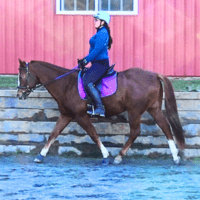I have to agree that horseback riding is expensive and I am not going to try to convince you that it is not. Do you ever wonder why it costs so much to horseback ride?
I’ll give you an easy answer to why it’s expensive and then explain in more detail, so you are really able to grasp all the factors involved.
Horses are expensive to maintain. Horses eat grain, a lot of hay, some need supplements or medication, they need trimming and possibly shoes every 4-8 weeks, yearly dentistry, yearly health check-ups, vaccinations, de-worming, bedding for the stalls, any lameness or emergency vet expenses and require a lot of work to care for. Horses are not cheap, so neither is horseback riding.
Before I explain further the factors causing horseback riding to be so expensive, I just want to mention that many hobbies and sports are expensive not just horseback riding.
The cost of activities, hobbies, and sports have risen with inflation. I have been reading about how kids’ sports teams are reaching an all-time high on costs. Many kids are unable to afford to do sports because it is out of their families’ budgets. These sports are running in the thousands of dollars a year to be able to participate in.
Today for example guitar, dancing, and fencing lessons can be just as expensive as horseback riding lessons and sometimes even more expensive. I know random examples.
But I just wanted to give you perspective on the fact that horseback riding costs are right there with other hobbies and sports, and are not some expensive sport only the rich kids can participate in.
Now that your eyes are open to that realization. Let’s talk about why horseback riding lessons are expensive and the breakdown of the costs involved.
My YouTube Video Answering This Question:
List Of Factors Contributing To The Expense Of Horseback Riding Lessons
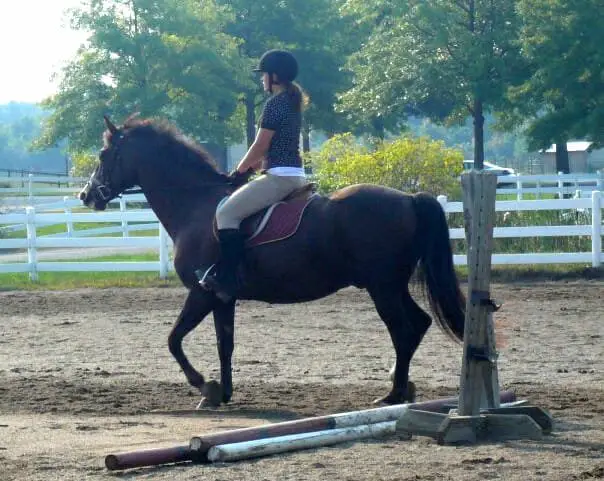
Lesson barns will have different prices for horseback riding lessons. The prices are what most people would consider expensive. Some barns have you pay for a package of lessons while other barns have you pay per lesson.
In general, lesson prices can range from $35 to over $100. Why such a wide price range you may wonder. This is because there are different factors that determine how expensive the lessons are. Which I am going to list briefly and further explain throughout this post.
Factors that contribute to the cost of horseback riding lessons:
- Property cost
- The start-up cost of farm equipment and tack
- Insurance cost
- Instructor salaries
- Barn care staff salaries
- Cost to maintain the horses
- Horses Riding Availability
- Discipline of riding
- Competition or Hobby Riding
- Location of the barn
- Business owners choice of price
How Property Cost Impacts Price Of Riding Lesson
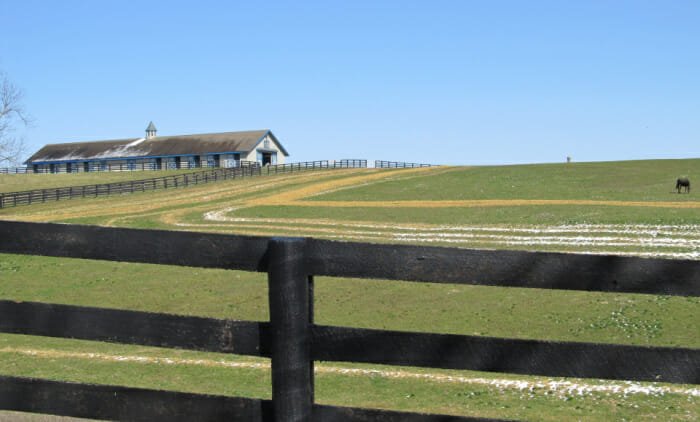
You probably notice that different lesson barns have different facilities, amenities, and amounts of land.
Some of these farms are pristine, in good condition, high class, and beautiful. While other farms are well worn, not fancy, but safe and do the job. And then there are the farms that are messy, a safety hazard or not ideal for horses.
Each of these kinds of properties are at different price points. The location also plays a part in how much the property cost. The further from major cities the cheaper the property typically will be and the closer the more expensive the property.
The mortgage or business loan has to be factored into the farm’s business plan. This will often effect the price of riding lessons. You can expect to pay more money for an upscale facility with many amenities, compared to a barn that is not fancy and doesn’t have as much to over property wise.
How Farm & Horse Equipment Costs Impact The Cost Of Riding Lessons
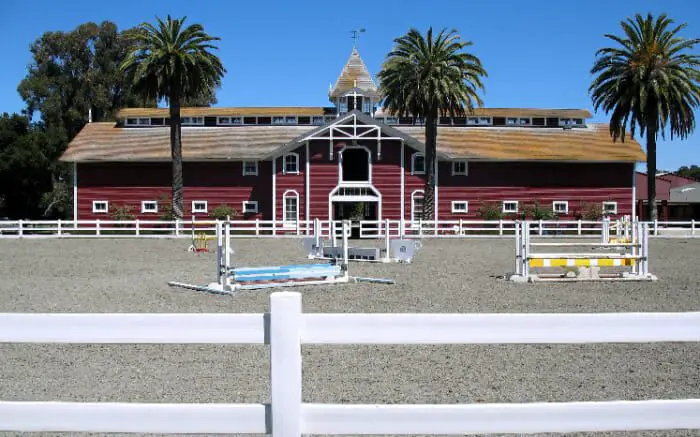
Farm equipment needed could be
- a tractor,
- arena drag,
- watering system,
- ATV, trucks,
- jumps,
- trailers,
- and more.
Horse equipment could include the equipment to care for the horses, like
- wheel barrels,
- pitchforks,
- brooms,
- brushes,
- grooming tools,
- tack
- saddles,
- saddle pads,
- girths
- bridles,
- bits,
- boots,
- blankets,
- halter,
- lead ropes,
- lunge line
- and the list can go on.
These items are not cheap and add to the overall overhead cost of the business. Even after buying these items, they need to be replaced if they become worn out or broken, or at least repaired, which still cost money.
So equipment and the upkeep of equipment is a cost that has to be taken into consideration when thinking of the pricing of riding lessons.
Insurance Costs Another Factor For The Cost Of Riding Lessons
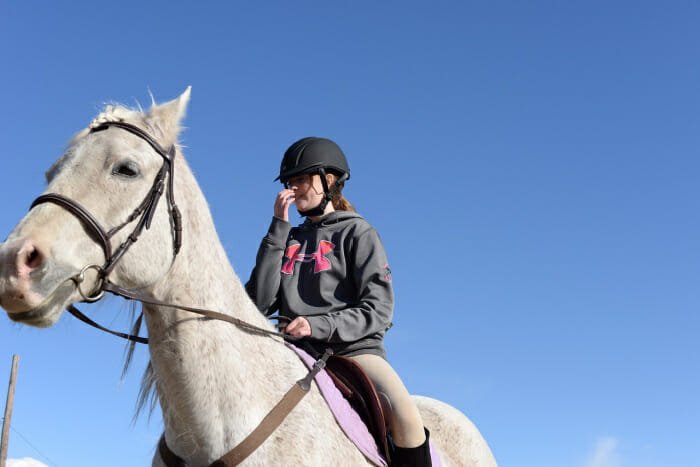
A riding lesson barn needs insurance. Even a private boarding barn really does need insurance. But insurance for a riding lesson barn or a multi-service will cost more money than just a private boarding barn.
If you are at a private boarding barn and want an instructor to come and give you a lesson on your horse. It is usually required by the boarding barn that the riding instructor has the proper insurance to do so.
Insurance is usually paid once a year but can sometimes be paid at different intervals. This gets factored into the cost of lessons.
How Instructor Salaries Affect The Pricing Of Horseback Riding Lessons
Riding instructors working for a lesson barn will be paid differently than an instructor that travels to barns and differently from an instructor that owns their own business.
Prices can also differ between instructors because one instructor has more experience than the other. Usually a higher level proven instructor will be paid more than an instructor teaching beginner riding lessons.
Some instructors get paid per lesson a commission, while others get paid per hour, and some get a commission per student .
The amount of money going to the instructor per lesson is a factor when a lesson barn determines the pricing of riding lessons.
How Barn Staff Affect The Cost Of Riding Lessons
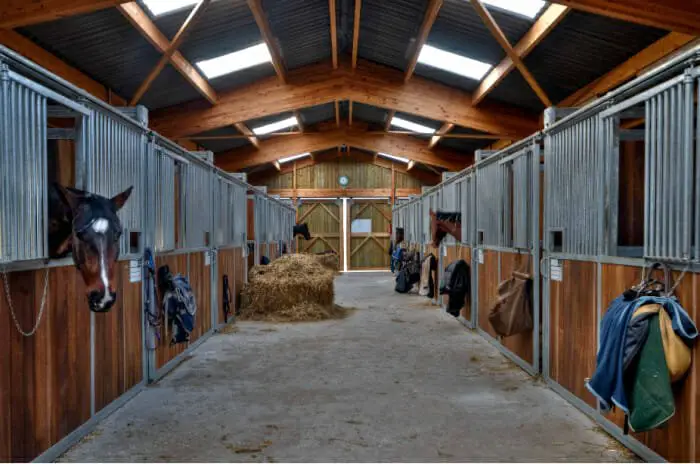
So the instructors get a cut from the lesson prices but they aren’t the only ones. Horses are labor-intensive (a lot of work) animals to maintain. They can’t take care of themselves.
They are not like dogs where you just feed them a bowl of food morning and night. Let them out a couple of times to pee and poop. Take them out for a walk or run and they are good. They are even less like a cat that can almost take care of themselves with the right set up.
No horses are high energy, injury, sickness prone, flighty animals that are a lot of work to take care of and you need the right facility for them. Ideally, as much turnout space and time as possible is best for horses. Unless they are injured and need to be on stall rest.
Horse businesses need barn staff to take care and keep an eye on the horses. They are kept busy with mucking stalls, dumping scrubbing and filling water buckets, cleaning paddocks, de-cobwebbing, turning horses in and out, checking horses over for cuts or injuries, feeding grain and hay meals, and more.
The money that goes toward paying barn staff for care of the horses will get factored into the cost of lessons.
The Cost To Maintain The Lesson Horses
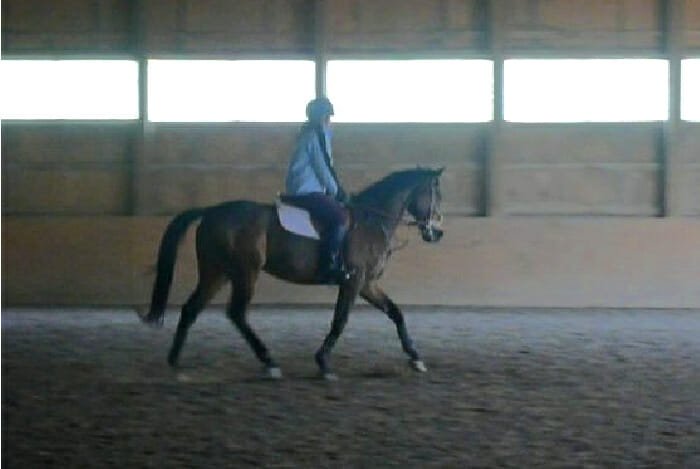
There is a lot involved with the cost of horses. Aside from the other costs already mentioned the cost to maintain the lesson horses are probably one of the main expenses in a lesson business other than the overhead of property, insurance, and salaries.
Many lesson horses are older and require extra maintenance whether for arthritis, Cushings, or something else. Which means more expenses.
Costs Associated With Maintaining Horse (For average horse and prices I see in the New England area)
- Hay roughly 15 bales a month $7-15 bale
- Grain 4-8 bags per month $15-$30 bag
- Shavings 8-15 bags per month $4- $7 bag
- Supplements (ex: joint, vitamin, weight gain, hoof) $15-$300 month
- Trim or Shoeing $50-$350 every 4-8 weeks
- Dewormer $40 for manure testing 4x year $5-$20 for a tube of wormer
- Vaccinations $100-$200 twice a year
- Coggins $50-$100 yearly
- Teeth Floating $100-$250 once or twice a year
- Bodywork (massage, acupuncture etc.) and saddle fitting- can range not all barns will do this for their lesson horses some will.
- Unexpected vet calls and emergency- can range to all sorts of numbers
So those are some costs you can find with maintaining a horse. If you start doing the math it can be pretty expensive.
Horse Riding Availability Affects Cost
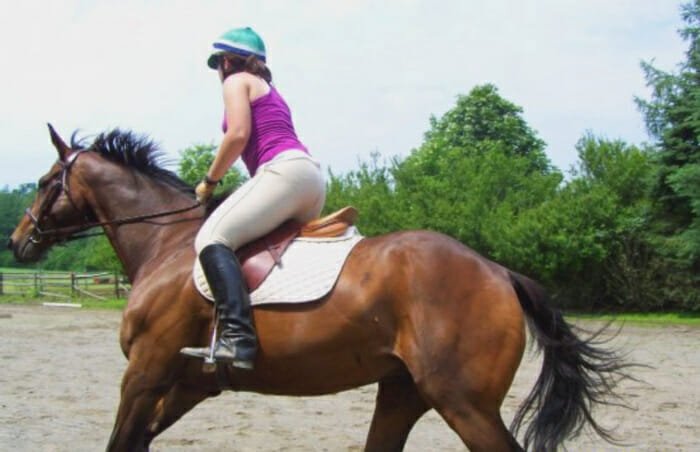
Horses can only be ridden so much. How much the horses are able to be ridden will affect how much money the business can make from lessons.
They want to work the horses that they make enough profit but at the same time not overwork the horses. So this can be a factor when they decide how much to charge for lessons.
Lessons are often cheaper if you ride your own horse but if the instructor has to travel to your barn then a travel cost will usually be added to the lesson fee.
Discipline Of Riding Can Contribute To The Cost Of Lessons
The discipline of riding can have an effect on the price of lessons.
For example eventing and needing a cross country course. Showjumping and needing a jump course. Reining and needing a big enough arena.
Compared to western pleasure, English pleasure, or dressage for example doesn’t need as big of an arena or as much training equipment.
Competition Or Hobby Riding Can Mean More Or Less Expense
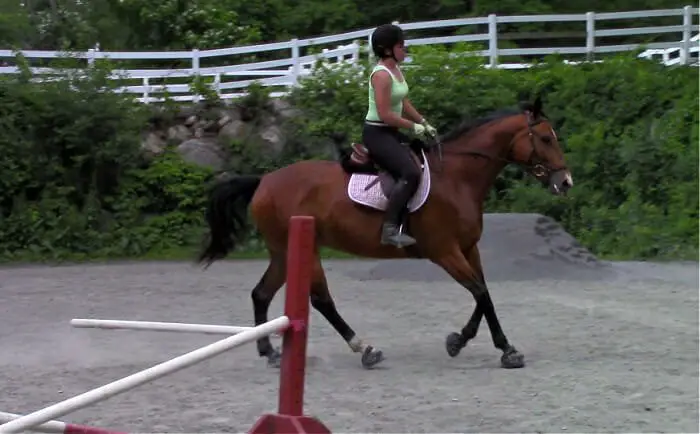
A competition barn will typically charge more for riding lessons compared to a lesson barn that is more focused on teaching riding as a hobby and for fun.
The competition barn may have a higher caliber facility or they may have more competition experienced riding instructors that they pay more money to.
The focus at a competition barn will be getting the riders ready to show, improve in their riding, and compete.
The hobby barn may have more of the basics for amenities. The focus will be more on developing your skills as a rider, learning safety on and around horses, and communicating with the horse.
Location Of The Barn Is A Factor On Lesson Price
A barns location will have an effect on the prices for services. This is similar to when I mentioned about the property being a factor. Usually, when a barn is closer to the city more accessible to a lot of people it will be more expensive. People have to choose if they want convenience at a higher price.
When a barn is located more in the countryside with fewer people around usually the services are at a lower price point. Then people have to decide if they want a lower price but are willing to drive a further distance.
Like I mentioned before the properties are typically cheaper in the more rural areas and more expensive towards more populated areas.
Business Owners Choice Of Price
The horse business needs to make enough money to cover expenses and make a profit.
The last factor is how much the owner of the business wants to price lessons. They have to go over all the factors I have covered and figure out how many lessons they can comfortably do with the lesson horses available.
Then they figure out what base line to break even would be. Then they want to make a profit. So it would depend how much profit they want to make.
Too expensive and they won’t be able to get clients, too cheap and they won’t be able to keep the business going.
Summing Up Why Horseback Riding Is Expensive
So now you can see there is a lot involved with the price of horseback riding lessons. It’s not simply slapping an expensive price tag on the service.
There are factors that bring the cost of riding up, just like other sports and hobbies.
Luckily if you can’t afford to pay for riding lessons there are alternatives so you can still take riding lessons if you are willing to work for it.
Comment below if you would like to learn ways to ride when you can’t afford lessons.
Have an awesome week!
Cheers, Kacey

